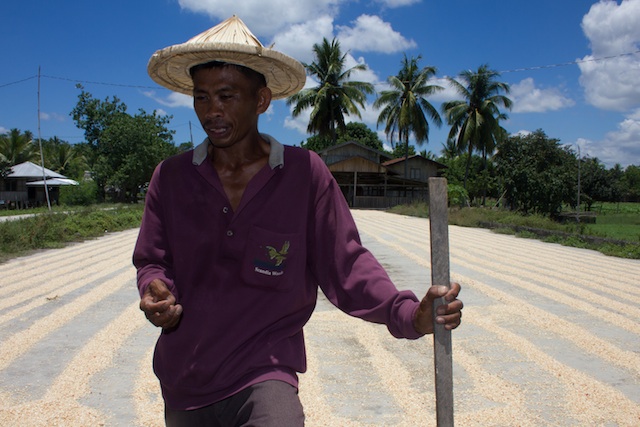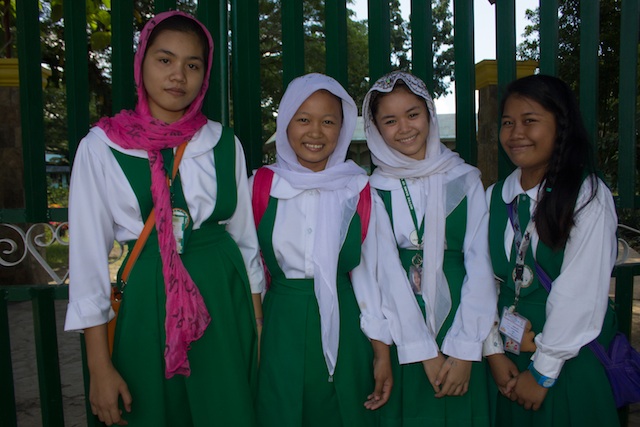DATU PIANG, Maguindanao (MindaNews/27 March) – The Comprehensive Agreement on the Bangsamoro (CAB) that the Philippine government and Moro Islamic Liberation Front (MILF) will sign in Malacañang today (March 27) may seem like a complex set of documents that would pave the way for the creation of a new autonomous political entity called the Bangsamoro, but for farmers in Barangay Liong, its significance is simplified in three oft-repeated responses: “wala nang gulo” (no more war), “di na kami magbakwit” (we will no longer flee our homes) and “makaani na nang sige-sige” (we can harvest what we plant).
In a village where planting and schooling and daily living are often interrupted by little and big wars, Babu Ginumbay Kuban can only hope that the signing in Malacañang will, indeed, bring the peace that has eluded them for decades.
“Kung magkapirmahan na, di na siguro kami magbakwit” (If they sign, then we don’t need to flee our villages anymore), Babu Ginumbay Kuban said when MindaNews visited their barangay last Monday.
Kuban, 54, and her relatives, cannot count the times they’ve had to evacuate since they were children, due to armed clashes between government troops and Moro rebels or due to “grudge” between Moro clans.
Kuban said they just returned to the village after three years of seeking refuge in Cotabato City.
Lanex Mamadaleg, 43, looks forward to a future free from armed conflict (“wala nang gulo”) so they can harvest what they plant (“makaani na nang sige-sige”).
 Lanex Mamadaleg dries his harvested corn in Barangay Liong, Datu Piang, Maguindanao province on March 24, 2014. MindaNews photo by Toto Lozano
Lanex Mamadaleg dries his harvested corn in Barangay Liong, Datu Piang, Maguindanao province on March 24, 2014. MindaNews photo by Toto Lozano
At the Notre Dame of Dulawan, young Moro women attending this Catholic school here, told MindaNews they hope that with the signing of the peace agreement, their school will no longer be turned into an evacuation center.
In the war the followed the aborted signing of the Memorandum of Agreement on Ancestral Domain (MOA-AD) between government and the MILF in August 2008, thousands of bakwits pitched tents and other makeshift dwellings on almost every square meter of the poblacion in 2008 and 2009 – at the park, the space above and under the playground slide, the gazebo, the covered court, the streets outside the fenced compound, the mosques, the fire department, the public library, the former Supreme Court’s Shariah Court-turned-multipurpose hall, the civil registrar’s office, and schools, including the Notre Dame of Dulawan.
Notre Dame students Noronnisah Satol, 15; Farisah Benjamin, 13; Alissa Singh, 13, and Roahidi Salido, 13, were in Grade 2 when their campus became an evacuation center for several months.
Tents for bakwit families were pitched in what used to be their playground.
 Notre Dame students Noronnisah Satol. Farisah Benjamin, Alissa Singh and Roahidi Salido MindaNews photo by Toto Lozano
Notre Dame students Noronnisah Satol. Farisah Benjamin, Alissa Singh and Roahidi Salido MindaNews photo by Toto Lozano
Today, Noronissah, Farisah, Alissa and Roahidi are in Grade 7. They may not know the details of the peace agreement that would be signed but they told MindaNews they hope this will lead to a “wala nang gulo” atmosphere to allow them to pursue their dreams to be a nurse, a policewoman, a tourism officer and a teacher.
Fr. Roberto Layson, parish priest of the Sta. Teresita church here and head of the Oblates of Mary Immaculate’s Inter-Religious Dialogue, told MindaNews that more than anyone else, civilians who had been caught in this cycle of wars for nearly five decades now, must benefit from what the peace agreement promises to deliver.
A veteran of three wars in Pikit, North Cotabato when he was assigned there between 1997 until just before the 2008 war, Layson acknowledged the fears that are being expressed about the peace pact but “we must believe more in our faith rather than in our fear.”
“The only way to peace is peace itself. Otherwise, we will turn into pieces,” Layson said.
